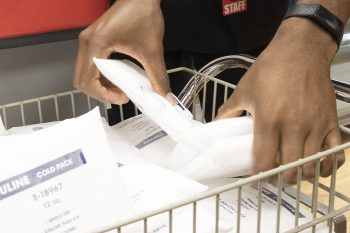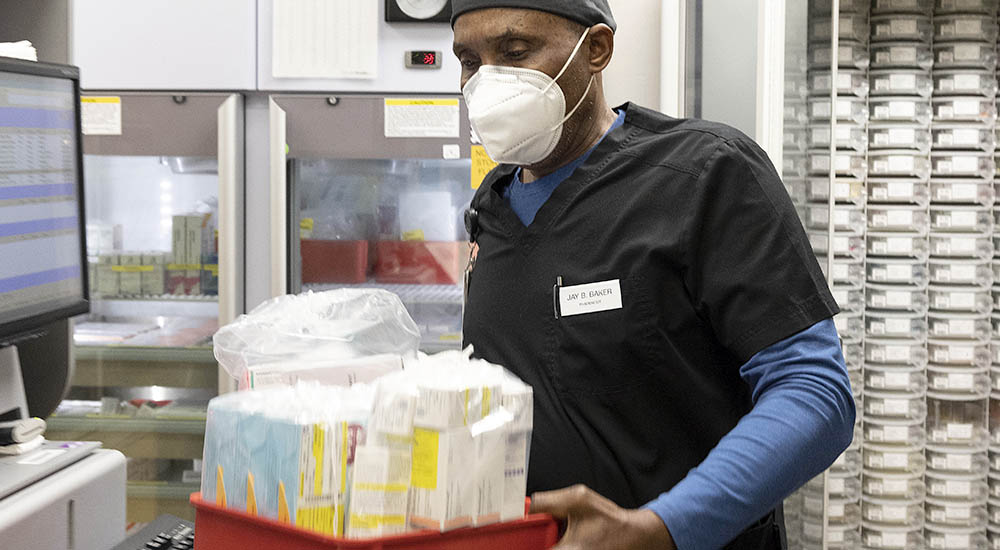The West Texas summer heat impacts every rural West Texan. Veterans who depend on medications that don’t do well in the heat are at risk of hospitalization if that medicine goes bad.
West Texas VA has embarked on a pilot program called “Beat the Heat” to ensure their Veterans have all the temperature-sensitive medications they need to see them through the hottest months of summer.
Veterans who rely on temperature-sensitive medications, such as insulin, normally receive a 30-day supply at a time. Those medicines are shipped in small shipping coolers packed with ice. This method of shipping works well in most circumstances.
However, when summer temperatures reach highs in excess of 100 degrees for days on end, this method of shipping does not always protect the medications inside. This leads to costly losses of expensive medications, delays in Veterans receiving them and additional costs in having to re-ship medications.
Pictured above, pharmacist Jay Baker certifies medication packs to be shipped to West Texas Veterans.
A solid, workable plan
“We’re always looking for ways to improve how we deliver health care to our Veterans,” said director Jason Cave. “This team has developed a solid, workable plan that will improve the lives of our Veterans. I look forward to the feedback of the pilot program.”

Pharmacy Technician Cedric Robins packages temperature sensitive medications in specially designed cooler shipping containers along with cold packs and readies them for transportation.
The hospital has been developing a plan over the past several months to alleviate these issues. The result is operation Beat the Heat.
Pharmacists, doctors and others devised a pilot program to ship a 90-day supply of these critical medications to Veterans before the summer temperatures begin to bake the West Texas landscape. They put this pilot program into action in June.
Sounds like a simple feat but has its challenges
Considerations include the stability of the Veterans’ medication treatment plan and the ability of the Veteran or their caregiver to properly store and care for the medications.
Also affected are which medications are appropriate for this effort. Other factors also went into developing operation Beat the Heat.
“A great deal of planning went into this effort,” said Associate Chief of Pharmacy Wendy Brown. “Our team screened every Veteran in our area who receives these medications. We discussed the plan with them and asked if they wanted to participate in the pilot program.”
More than 100 West Texas Veterans opted to participate
The medical center doesn’t typically maintain enough of these medications to send a 90-day supply to Veterans.
Part of the planning began months before. The pharmacy team worked with Fiscal and Logistics Services to purchase large quantities of the mediations. They sent the medicine to Big Spring for appropriate storage in advance of this effort.
“Handling medications is always delicate,” said Chief of Logistics Carla McCullough. “But these medications require a greater degree of care. They cannot simply be placed in a box or envelop and sent out.”
Large quantities of special cooler-shipping boxes and ice packs were ordered well in advance to support Beat the Heat.
Program to expand if pilot successful
Shipping the 90-day supply now will put medications in the hands of Veterans in time to last throughout the summer months. After looking at years of average summer temperatures, Brown and her team of pharmacists and technicians determined the first week of June was the best week to execute Beat the Heat.
If the pilot program is successful, the staff plans to expand the program to include more medications in coming years. Also, the program potentially will be the standard operating practice for the health care system.
The estimated savings is in the tens of thousands of dollars from this year’s campaign. Once the feedback from the Veterans, cost analysis and efficacy of the program is evaluated, we will begin planning for next year.
West Texas VA fills more than 20,000 prescriptions monthly. It serves more than 13,000 Veterans across its 55,000-square-mile catchment area.
Michael Cole is a Navy Veteran and public affairs officer with the West Texas VA Health Care System.
Topics in this story
More Stories
Veteran Byron Potier weighed almost 300 pounds and was tired and lethargic. He was the perfect candidate for gastric sleeve surgery.
How much do you know about VA care, benefits and services? Don’t miss out on what you've earned—check out the "2025 VA Federal Benefits Guide for Veterans, Dependents, Survivors, and Caregivers" handbook to learn more.
Feeling stressed? Your breath can help you relax and focus. Take 3 minutes to reset and prioritize your well being for this week's #LiveWholeHealth practice.







I DO NOT TRUST VA, NEVER WILL, I AM 100% service connected vietnam veteran.